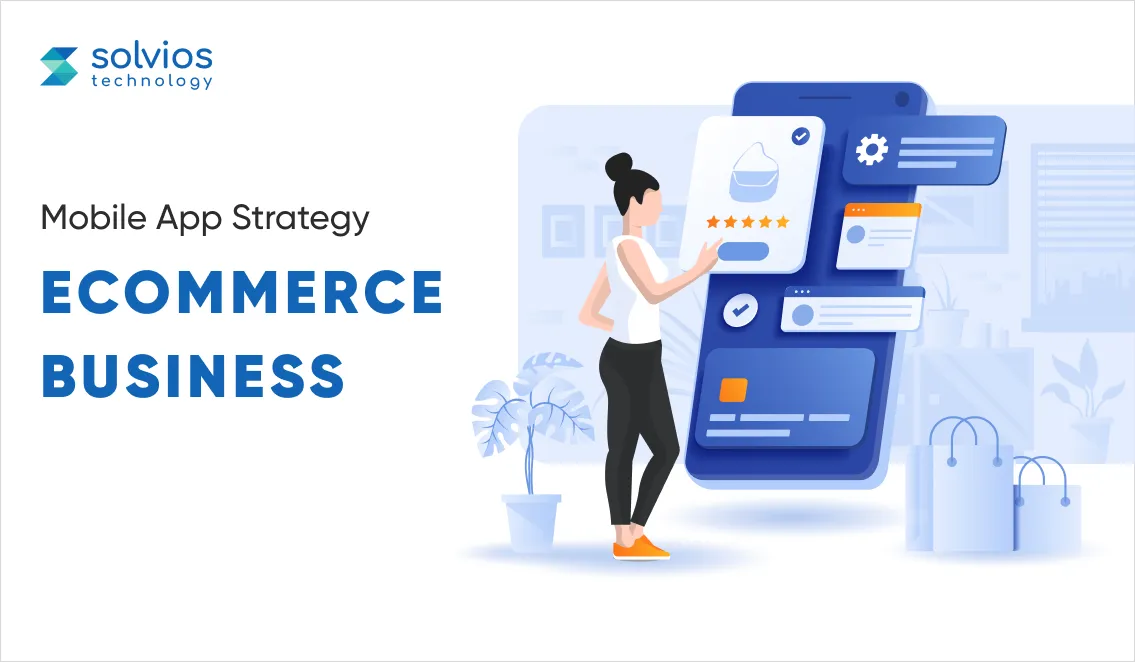
E-commerce is rapidly expanding into mobile apps, and mobile internet service providers allow businesses and customers to stay connected 24/7.
Because operating system-friendly applications have become more and more popular, the value of businesses has increased exponentially as a result of the fast growth in the use of mobile phones, tablets, laptops, and all other IoT devices.
This blog offers essential tips for E-Commerce Mobile App Development and answers the most often-asked issues regarding how to create an e-commerce website and business.
Necessity of Developing an E-commerce App
Human lifestyles have been profoundly changed by the mobile revolution, and this tendency is not exclusive to the eCommerce industry. With e-commerce apps, users may use the entire globe as their storefront, achieving business goals by offering clients quick and easy ways to make purchases.
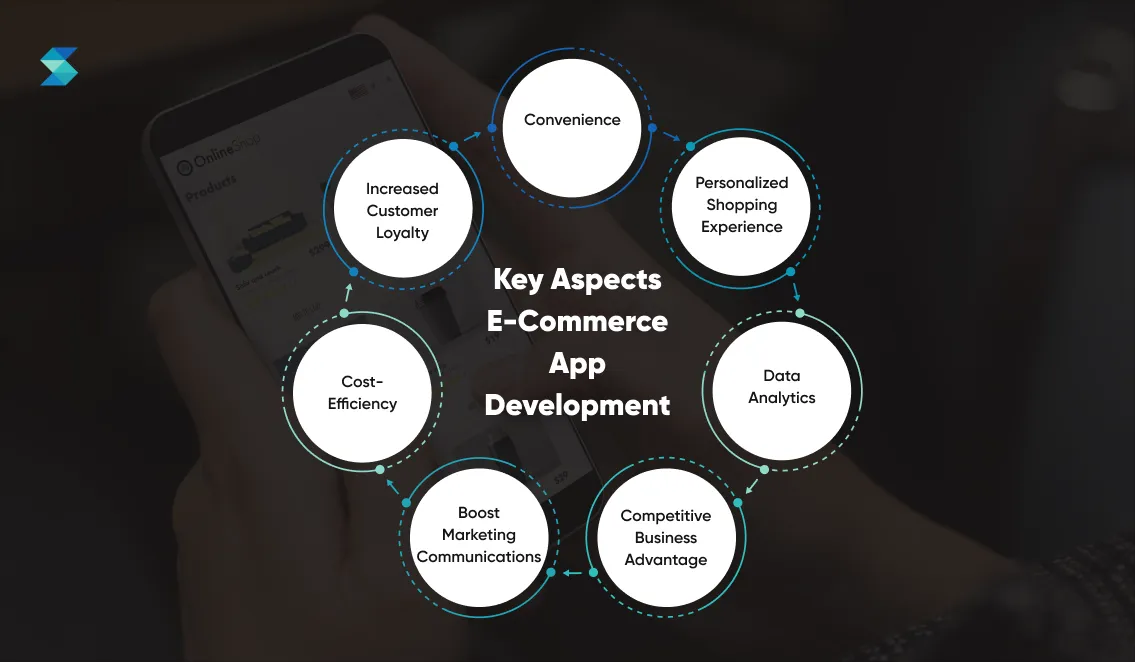
Here are some lists of some key aspects that trigger the importance of having a mobile app for your eCommerce business.
- Convenience – Your customers can shop whenever and wherever they want, whether they’re at home, at a party, on their way to work, or somewhere else entirely. Your app’s e-commerce store works nonstop to ensure that your online presence is constantly reachable.
- Personalized Shopping Experience – The individual referring to this is an amiable retailer who knew their name and inclinations. Customized buying experiences and recommendations may be able to assist your app in accomplishing the same goal of making users feel noticed. By utilizing developing technology, mobile apps can offer useful customer insights, such as preferences, shopping time, and decision-making time.
- Data Analytics – A useful feature of an e-commerce app is its ability to analyze user activity, trends, and preferences. By modifying your services and marketing strategies, you may apply this essential expertise to establish yourself as a digital expert.
- Competitive Business Advantage – People mostly prefer to purchase through mobile applications, which could lead to a fall in or possibly the extinction of sales from websites. You can gain a competitive advantage over other online businesses that haven’t released a mobile eCommerce app by developing one. If buyers are undecided between your website and one of your rivals, they may elect to purchase using your mobile app.
- Boost Marketing Communications – Marketers can boost customer engagement and encourage purchases by offering push notifications on mobile apps about new products, discounts, and offers, thereby maximizing campaigns’ profits from both current and new clients.
- Cost-Efficiency – Developing e-commerce apps has several advantages, such as lower overhead, maintenance costs, and scalability without needing a large number of store employees. Like a real store, an e-commerce app provides users with the comfort and convenience of portability.
- Increased Customer Loyalty – A Statista study reveals that 87.6% of U.S. consumers download mobile shopping apps for special deals or coupons, while 79.7% download them for loyalty and reward programs. Through mobile apps, customers can easily learn about exclusive deals and get real-time dashboards for rewards, offers, and loyalty points.
Effective Strategies to Launch and Grow an Ecommerce Business
Learn the BenefitsCreating a Mobile App Strategy for E-commerce Business
The demand for e-commerce mobile applications keeps growing like wildfire. However, businesses must invest in the right mobile app strategy and follow the right path for app development to leverage more. Here are the five fascinating steps every eCommerce business should follow for developing a successive mobile app strategy.
1. Identifying your Business Objectives and Target Market
Determining what you want your e-commerce app development to do is the first step in designing it. Which would you prefer more sales, more customers, or better in-store experiences for your existing customer base? By initially determining your objectives, you may develop an app with features and capabilities that will assist you in reaching them.
If you want the best mobile app strategy for development to promote your app, you must clearly define your target market, understand their needs and preferences, and create your app accordingly.
By getting to know your target audience, you may modify the app’s features and functions to properly appeal to them.
2. Choosing the Right Platform
Choosing the right platform for your e-commerce application development, iOS or Android, is important because it affects the benefits and cons and preferences of your target audience as well as your business.
Apps for iOS must first receive Apple’s permission before being released in the App Store, as the platform is closed. Although the App Store approval process is more difficult and time-consuming, higher-quality apps are usually the result.
Android is an open platform, allowing apps to be published on the Google Play Store without requiring Google’s approval. The increased competition on the Google Play Store has made it easier and faster to publish your app.
The optimal app platform depends on your specific needs and goals, with iOS being ideal for high-end audiences and Android for mass-market audiences.
3. Designing and Developing your App

The process involves creating the app’s vision, UI and UX design, and developing the backend code. The user interface (UI) of your software is its visual design, whereas the user experience (UX) focuses on how easy and enjoyable it is to use overall.
Your app’s backend code handles all of its operations, including data processing, storage, and server-side communication.
Want to Increase Conversion with an Engaging eCommerce App?
Contact Our UI/UX Experts4. Testing and Launching your App
Thorough testing is essential after developing, testing, and launching your app to ensure it is bug-free and user-friendly. Test your app with friends, family, and beta testers, but it’s better to hire a professional QA company specializing in such services. QA companies possess the expertise to test apps on various devices and operating systems, enabling them to identify potential issues that developers may not have noticed.
Using QA services enhances app quality, boosts market success, and saves time and money by preventing costly defects from being released to production. You can release your app on Google Play or the App Store after it’s complete.
5. Marketing and Promotion
It’s critical to promote your app using social media, search engine optimization, and paid advertising after it launches. By advertising your app on social media platforms like Facebook, Instagram, and other sites, you might potentially draw a large number of users.
Enhancing your app’s website to appear higher in search engine results on pages so that users may find it when looking for relevant keywords is known as search engine optimization or SEO.
Using paid advertising to market your app to a particular demographic works well. Social media pages, other websites, and search engine results pages can all produce and display ads.
Conclusion
Although it can be difficult, eCommerce application development that is well-designed and optimized can greatly boost sales. Developing easily user-friendly e-commerce applications requires much expertise with best practices in e-commerce Development Solutions.
The guidelines above allow readers to learn mobile app-creating techniques by sharing marketing strategies for successful e-commerce app development in 2024.
Additionally, to ensure the greatest user experience for your e-commerce mobile application, get in touch with a reputable mobile app development company like Solvios. eCommerce experts at Solvios can guarantee that the development of your mobile app will be scalable, professional, and user-friendly.
We Transform eCommerce Business with Proven Strategies.
Hire eCommerce ConsultantTags
Related Blog
Want to get started with App Development?
These applications are acquiring enormous prevalence by offering hands-on enterprise mobility solutions for organizations around the globe.
Start A ConversationLatest Blogs
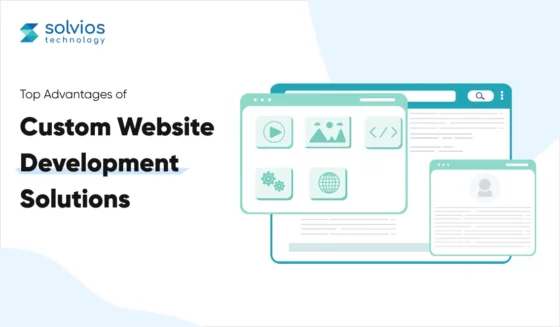
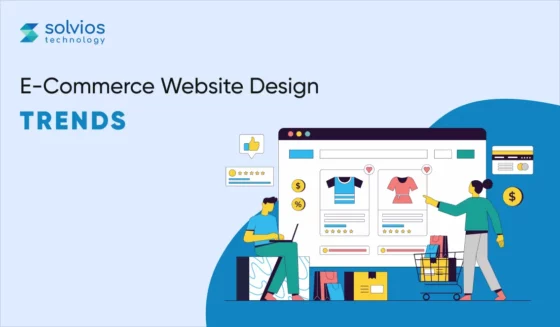
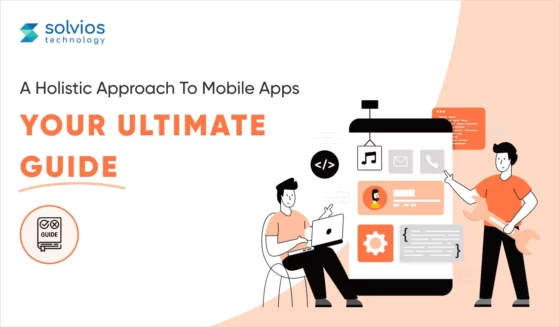

Custom Website Development Solutions: A Way to Achieve Long-term Success
Read More














